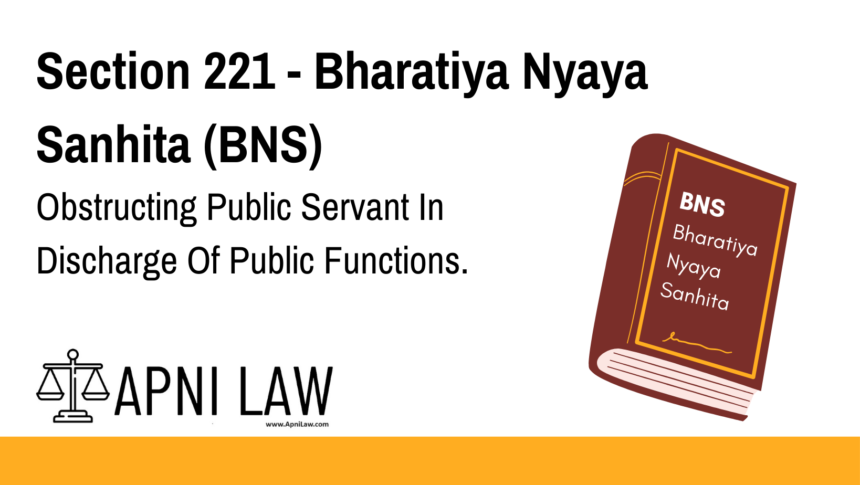Code: Section 221 BNS
Whoever voluntarily obstructs any public servant in the discharge of his
public functions, shall be punished with imprisonment of either description for a term
which may extend to three months, or with fine which may extend to two thousand and
five hundred rupees, or with both.
Explanation of Section 221 BNS
Section 221 of the Bharatiya Nyaya Sanhita, 2023 (BNS) penalizes individuals who intentionally obstruct public servants while they are performing their lawful duties. This provision ensures that government officials can carry out their responsibilities without undue interference.
Key Aspects of Section 221 BNS
- Voluntary Obstruction: The obstruction must be intentional, meaning accidental hindrance does not qualify as an offense under this section.
- Public Servant: The law protects officials such as police officers, government employees, municipal workers, and others engaged in public service.
- Punishment:
- Imprisonment for up to three months,
- A fine of up to ₹2,500, or
- Both imprisonment and fine in some cases.
This provision ensures the smooth functioning of public duties and prevents citizens from unlawfully hindering government work.
Illustration
Example 1: Stopping a Municipal Worker from Carrying Out Duties
A municipal worker is clearing an illegal encroachment, and a shopkeeper forcibly stops him from performing his task. This act amounts to an offense under Section 221 BNS.
Example 2: Preventing a Police Officer from Making an Arrest
A group of individuals prevents a police officer from arresting a suspect by blocking their path or physically restraining them. This is a direct violation of Section 221 BNS, and the offenders may be punished.
Example 3: Interfering with Election Officials
During elections, a government officer is performing election-related duties. A person obstructs their work by stopping them from setting up polling stations. This is also an offense under Section 221 BNS.
Common Questions and Answers on Section 221 BNS
1. Who is considered a public servant under Section 221 BNS?
A public servant includes government officials, police officers, municipal workers, election officers, and any person authorized to perform public duties.
2. What is the penalty for obstructing a public servant?
The punishment includes imprisonment for up to three months, a fine of up to ₹2,500, or both.
3. Does Section 221 BNS apply to verbal threats against public servants?
No, mere verbal threats may not constitute “obstruction.” However, if threats lead to an actual hindrance of duties, this section may apply.
4. Can an accused person be arrested for this offense?
Since the maximum punishment is three months of imprisonment, it is generally considered a bailable offense.
Conclusion
Section 221 BNS plays a crucial role in maintaining law and order by protecting public servants from obstruction while performing their duties. This law ensures that government officials can work efficiently without undue interference.
For expert legal insights, visit ApniLaw today! 🚀











